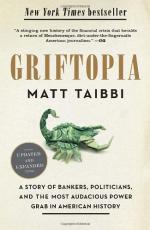
|
| Name: _________________________ | Period: ___________________ |
This test consists of 15 multiple choice questions and 5 short answer questions.
Multiple Choice Questions
1. Goldman-Sachs argued that investing in commodities futures would reduce risk and yield __________.
(a) Derivatives.
(b) T-bill returns.
(c) Speculative returns.
(d) Equity-like returns.
2. When was Henry Kissinger born?
(a) 1945.
(b) 1911.
(c) 1929.
(d) 1923.
3. A new investment vehicle called index speculation was comprised of two main indices which were the Goldman-Sachs Commodity Index and ____________.
(a) The Dow Jones-AIG Commodity Index.
(b) The NASDAQ-AIG Commodity Index.
(c) The Dow Jones-NASDAQ Commodity Index.
(d) The FICA Commodity Index.
4. In 2008, what 24-year-old of San Bernardino, CA, quit school because she suddenly couldn't afford the gas that it took for the daily trip?
(a) Sam Serenda.
(b) Leroy Marcus.
(c) Robert Lukens.
(d) Priscilla Carillo.
5. Oil prices spiked to how much a barrel in 2008?
(a) $120.
(b) $149.
(c) $110.
(d) $200.
6. Where was Scott Brown born?
(a) New York, New York.
(b) Chicago, Illinois.
(c) Kittery, Maine.
(d) Boston, Massachusetts.
7. In what year did President Nixon decide to rearm the Israelis, angering the oil-producing Arab states?
(a) 1977.
(b) 1973.
(c) 1945.
(d) 1978.
8. Nancy Pelosi has represented the 8th Congressional District of what state?
(a) California.
(b) Arizona.
(c) Alaska.
(d) New York.
9. When was Nancy Pelosi born?
(a) 1949.
(b) 1948.
(c) 1958.
(d) 1940.
10. OPEC is an intergovernmental organization of how many developing countries?
(a) 5.
(b) 15.
(c) 10.
(d) 12.
11. The Prudent Man Rule is based on common law stemming from what Massachusetts court decision?
(a) Amory v. Harvard College.
(b) Anderson and Smith v. Amory.
(c) Harvard College v. Amory.
(d) Yale College v. Harvard University.
12. Who negotiated an Israel withdrawal from the Sinai peninsula as well as an end to the oil embargo by OPEC?
(a) James Edwards.
(b) Gerald Ford.
(c) Henry Kissinger.
(d) Richard Nixon.
13. What occupation did Barack Obama have before earning his law degree?
(a) Civic engineer.
(b) Community organizer.
(c) High school teacher.
(d) College professor.
14. What does the CFTC stand for?
(a) The Community Finance Trading Commission.
(b) The Capitalist Futures Commission.
(c) The Congressional Finance Trust Commission.
(d) The Commodity Futures Trading Commission.
15. What refers to politics or diplomacy based primarily on power and on practical and material factors and considerations, rather than ideological notions or moralistic or ethical premises?
(a) Objectivism.
(b) Conservatism.
(c) Capitalism.
(d) Realpolitik.
Short Answer Questions
1. In December 2008, Chicago Mayor Richard Daley announced that he had leased out the city's parking meters for over ____________.
2. In 1991, Goldman-Sachs bought up a commodities trading company called ________.
3. The Commodity Exchange Act replaced what earlier act from 1922?
4. Where was Barack Obama born?
5. What political party is Nancy Pelosi a member of?
|
This section contains 391 words (approx. 2 pages at 300 words per page) |

|




